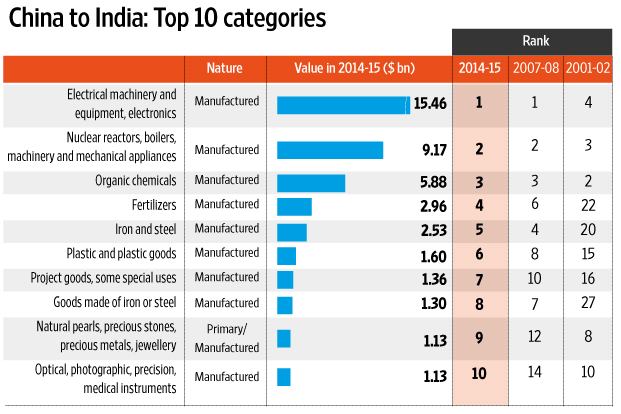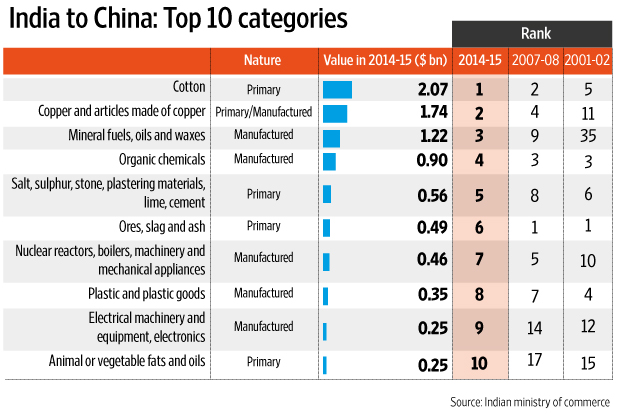Beijing/New Delhi, October 14 (NIA): Ultra-nationalists in India ,including sections of the ruling Bharatiya Janata Party (BJP), have called for the boycott of Chinese goods because China has sided with Pakistan on the issue of Kashmir and Pakistan-sponsored cross-border terrorism.
BJP National General Secretary Kailash Vijayvargiya asked people on Monday to boycott Chinese products because of “Beijing’s pro-Pakistan stand”. He tweeted that any economic support to China was “akin to weakening India’s security”.
But China, and also some sections in India also, say that any ban on Chinese goods will hurt India more than China. While Indian consumers will be denied access to affordable Chinese goods, China, which is a world economic power, can find other markets.
Chinese products are often the victim when regional situations get tense, and this phenomenon has been existing for quite a few years, notes Zhen Bo, Assistant Research Fellow at the Center for South Asia-West China Cooperation and Development Studies, Institute of South Asian Studies, Sichuan University.
There have been at least two prominent Indian boycotts of Chinese goods in the past few months, Zhen says in an article in China’s Global Times dated October 13. The first happened in April. It was caused by dissatisfaction over China’s stand on the issue of Maulana Masood Azhar, leader of the militant group Jaish-e-Mohammed active in Kashmir, who is accused of committing terrorist acts in India. The second was in July and because of China’s lack of support for India’s bid to join the Nuclear Suppliers Group.
Now Chinese goods are on the stage again due to the Kashmir issue.
However, regardless of the passionate boycott in India and Indian media’s hysteric reports of a “doomsday” for Chinese products, Chinese goods have never been condemned by Indian government and are popular across the nation.
The bilateral trade relationship is one of the pillars of the Sino-Indian relationship. The trade volume was over $70 billion in 2015, and China’s investment in India soared to around $ 870 million in 2015, six times what it was in 2014.
The boycott has not achieved success, Zhen says.
Sales figures for Chinese products on the top three Indian online retailers in the first week of October hit a new record. Amazingly, the Chinese mobile phone company Xiaomi sold half a million phones in just three days on the Flipkart, Amazon India, Snapdeal and Tata CLiQ platforms.

Some observers believe that China and India are competing with each other regionally and globally. While this might not be wrong, the negative effect of this competition shouldn’t be exaggerated too much if we see it in an objective way.
To some extent, the economic relationship is the barometer of the political relationship. There shouldn’t be huge fluctuation in terms of economic cooperation if the political relationship keeps steady between the two.
For the dragon and elephant, enhancing economic ties would be a preferable way to promote the comprehensive bilateral relationship. The more economic cooperation exists, the more opportunities there will be for Chinese products to enter the Indian market. India is a big potential market, and people using smart phones and doing online shopping has become the irreversible trend in the new era.
The commercial cooperation between these two countries could also be focused on e-commerce, service and financial investment. The Alibaba mode has already been broadly studied and analyzed or even followed in India, which means the great demand for online business and financial services in India will definitely provide opportunities for their Chinese counterparts.
With enough experience and capital, some keen Chinese companies have already expanded their business into India. Hopefully, these early birds will get the worm soon, Zhen says.

Adverse Impact on India’s Pharmaceutical Industries
Meanwhile, Time of India said that the Indian authorities are evaluating options to ensure India’s pharmaceutical industry , heavily dependent on raw material from China, is not impacted.
India imports around 85% of Active Pharmaceutical Ingredients (API) used in medicine formulations from China. This poses a major risk of severe drug shortage if India’s diplomatic relations with China worsen.
In fact, any such crisis will also impact many other countries because India is a major supplier of low-cost generic medicines to the rest of the world.
As a proactive measure, the government and the drug regulator are planning a meeting with domestic manufacturers to formulate a strategy to avoid a crisis.
“It is true that we sour ce a lot of API from China and most Indian API manufacturers have shut shop over the years because Chinese products are much cheaper. We will call the industry very soon and discuss the issue with them and see if we can create our own capacities and reduce the dependence on another country ,” a senior Central Drug Standard Control Organisation official told Times of India..
Besides pricing pressure from Chinese products, the industry says issues like environmental obstacles and lack of infrastructure have also dissuaded local API manufacturers. In 2007, when the total domestic pharma market was around INR 35,0000 milion (US$ 5 billion), APIs accounted for over 15-20% o this.
In fact, NSA Ajit Doval had warned the government in 2014 about India’s over-dependence on China for API and that any kind of tension or adverse circumstances between the two countries could lead to a crisis in public health in India.
Following Doval’s alert, the government had formed a committee of experts to formulate a specific policy to boost API manufacturing in India.




























































